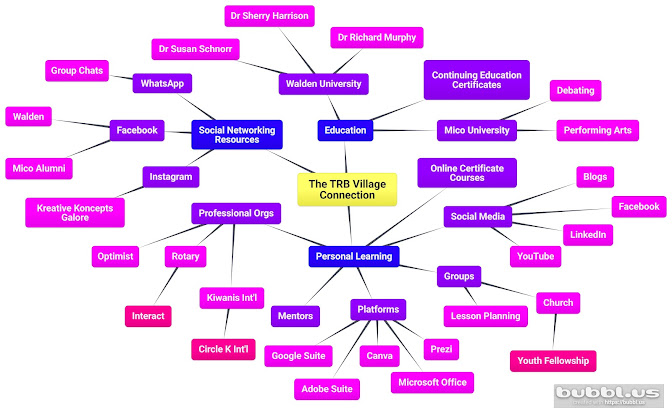Connectivism
Connectivism is a learning theory emphasizing the importance of creating and maintaining connections between people, information, and technology. Learning is about acquiring knowledge and creating networks of resources that can be accessed and used when needed. In other words, learning is not just an individual activity but a social one that involves collaboration, communication, and the ability to navigate complex digital environments. Connectivism highlights the importance of adapting to changing circumstances and continuously learning and updating one's knowledge and skills. (Siemens, 2005)
Below is a part of my network of connections. Before delving into this mind map, I thought I had but a few connections.
How has your network changed the way you learn?
My network has contributed to how I learn by providing access to a wealth of information and resources. I can connect with experts and peers worldwide through online communities and platforms and engage in collaborative learning. Depending on who I approach, I can get personalized learning opportunities that enable me to pursue my interests and goals. My network has made learning more accessible, engaging, and effective.
Which digital tools best facilitate learning for you?
The digital tools that best facilitate my learning are YouTube and LinkedIn. As a visual learner, YouTube is my most used resource, providing access to numerous tutorials and lectures on various topics. LinkedIn, on the other hand, is more geared towards professional development. It offers online courses and certifications that can help me enhance my skills and knowledge.
How do you gain new knowledge when you have questions?
When I have questions, I generally go to Google or find an expert in the field who can answer my questions. Since starting this course, I have found myself searching scholarly articles and blogs more than visiting my usual resources.
In what ways does your personal learning network support or refute the central tenets of connectivism?
My personal learning network can support the central tenets of connectivism by providing diverse perspectives and knowledge sources. This can help me to make connections between different ideas and concepts and to develop a deeper understanding of the subject matter. Additionally, my network provides opportunities for collaboration and knowledge sharing.
On the other hand, my network can refute the central tenets of connectivism if I rely too heavily on it and fail to engage in critical thinking and reflection. I have to balance using my networks to learn and develop my ideas and perspectives.
Reference
Siemens, G. (2005). Connectivism: A learning theory for the digital age. http://www.itdl.org/Journal/Jan_05/article01.htm


Comments
Post a Comment